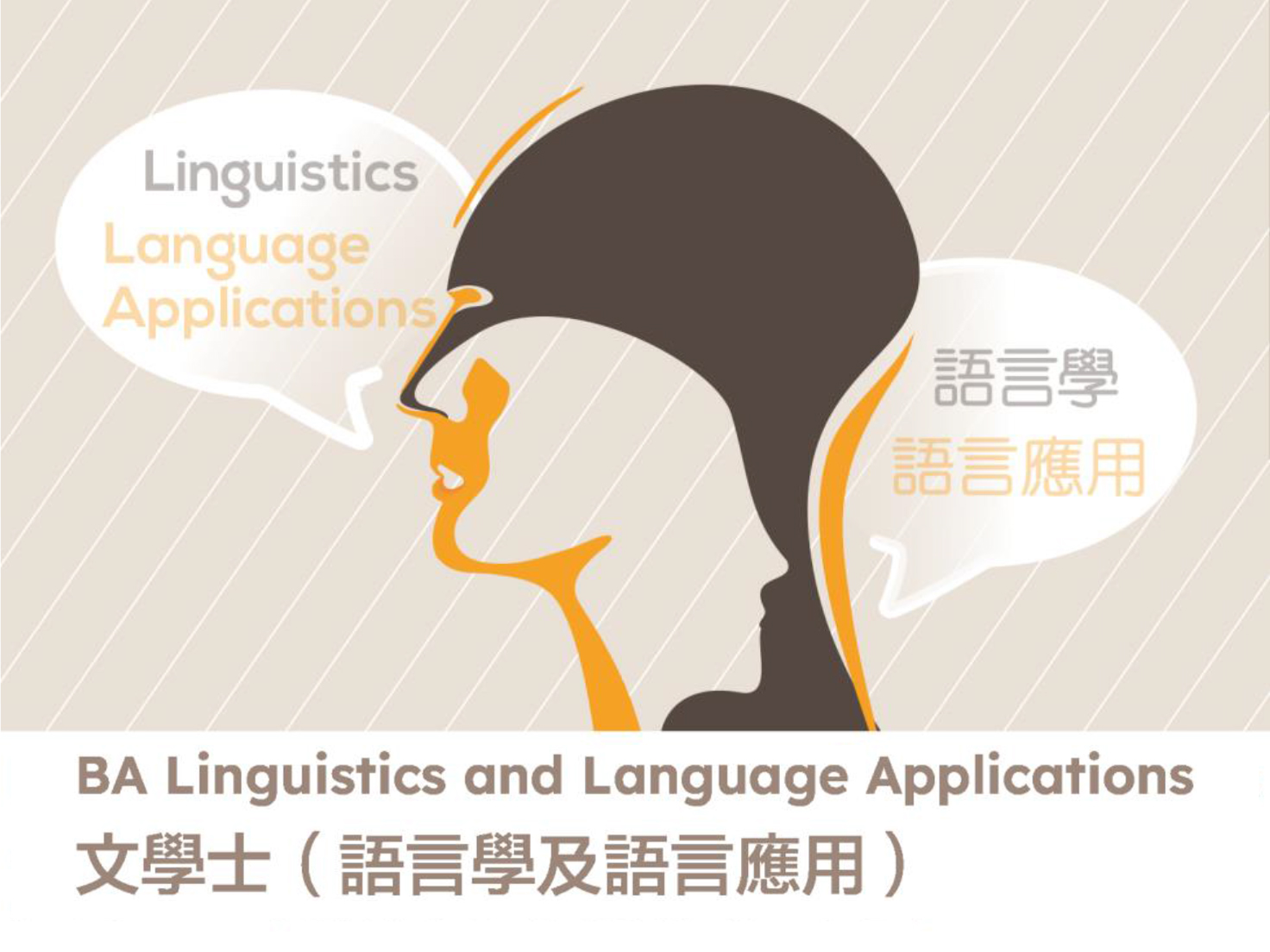BA Linguistics and Language Applications (Features: Linguistics / Language Applications / Language Technology)

1109 (JS1109)
Local Places:
25 (For First-Year and Advanced Standing I Entries; Tentative)*
Non-Local Places
(For Overall Direct Applications):
Around 400
Associate Professor, Department of Linguistics and Translation
Associate Professor, Department of Linguistics and Translation
* for JUPAS and non-JUPAS admissions
This major aims to educate students so that they will become language professionals who are familiar with linguistics and language-related applications. Students will also develop an analytical, critical and creative mind and an open attitude towards people from different cultures.
JUPAS Entrance Requirements
| JS1109 BA Linguistics and Language Applications | |
| HKDSE Subject | Minimum Level Required |
| English Language | Level 3 |
| Chinese Language | Level 3 |
| Mathematics | Level 2 |
| Citizenship and Social Development | Attained |
| Elective 1 | Level 3 |
| Elective 2 | Level 3 |
Notes:
- Besides Category A elective subjects, Mathematics extended modules (M1/M2) and “other languages” (at grade E or above) can also be used to meet the elective requirement. If students take both M1 and M2, they are counted as one subject only.
- Applied Learning subjects are not counted as elective subjects.
- For details of the alternative Chinese Language qualifications acceptable by the University for Non-Chinese Speaking (NCS) students, please click here.
To be considered for admission, you must satisfy the General Entrance Requirements.
There are two main subject areas: Linguistics and Language Applications.
- Core courses in Linguistics include: Fundamentals of Linguistics, Introduction to Linguistic Research, Language in Society, Language and Mind, Phonetics, Phonology, Syntax, and Semantics.
- Core courses in Language Applications include: Introduction to Language Technology and Computational Linguistics.
At a more advanced level, students may choose from among courses such as Computational Lexicography, Computer-Aided Translation, Computer-Assisted Language Learning, Conversation Analysis, Corpus Linguistics, Experimental Phonetics, First/Second Language Acquisition, Historical Linguistics, Psycholinguistics, and Sociolinguistics.
To find more details about the Programme Curriculum, please refer to the Programme Structure.
1. Participating in the internships and other co-curricular activities offered provides students valuable job experience in fields that require knowledge of languages, linguistics, and language applications.
2. Exchange programmes provide students with opportunities to gain experience of studying and living abroad for a semester, by paying the local tuition fees.
3. The department also offers two Joint Bachelor's Degree Programmes with National Taiwan University and Columbia University.
- Students can get 2 degrees by studying 2 years in LT and 2 years at a partner university. For detailed information, please visit https://lt.cityu.edu.hk/Programmes/Joint-BAs/.
4. Students may also opt for double majors within CityUHK and major plus minor programme or Undergraduate plus Taught Postgraudate Degree (TPg) programmes (https://lt.cityu.edu.hk/Programmes/CityU-Talents-Progs/Undergrad-plus-TPg/).
This major provides students with a solid foundation in the scientific study of human language. Students will be prepared for careers that require language expertise and language-related computing skills. In addition to opportunities in advanced studies, graduates will have employment prospects in education and research, as well as in administrative and executive positions in various public and private sectors. They will have an important role to play in language and information service sectors of Hong Kong, Greater China, and the world. Moreover, this major is recognized by the Education Bureau as an English language major degree for the purpose of teaching in Hong Kong.
With the growing popularity of the Web and apps as information resources and means of interaction, the field of language applications is advancing as academic institutions and industry partners work together to realise the growing potential of linguistically sophisticated applications.
Language professionals are needed not just for language teaching jobs at all levels, but also for vacancies in the private sector such as editors, technical writers, translators, reporters, journalists, anchor persons, PR personnel, etc.
According to the QS (Quacquarelli Symonds) World University Rankings by Subject (2023), Linguistics at City University of Hong Kong is ranked 41st in the world.
Student/Alumni sharing is available at https://lt.cityu.edu.hk/People/alumni/
LT maintains very good ties with alumni via Facebook (CityUHK LT/CTL Alumni: https://www.facebook.com/groups/503342298012646), Whatsapp (CityUHK LT/CTL Alumni: https://chat.whatsapp.com/Fi8j52yJkTX0Ea1HgZGrGZ), and 2 Wechat groups (CityUHK LT_CTL Alumni, 500 members, full capacity; CityUHK LT_CTL Alumni 2, 186 members).
Several dozens of alumni have already expressed their sincere wish to help with our LT Senior Mentor Programme enthusiastically. This is a great opportunity for senior students or fresh graduates to communicate with their predecessors 校友學長 about some of the possible puzzles in job hunting, workplace etiquette, work attitude and job prospects, or further studies in various continents.
+852 3442 8705
+852 3442 0359
Not required
Not required


